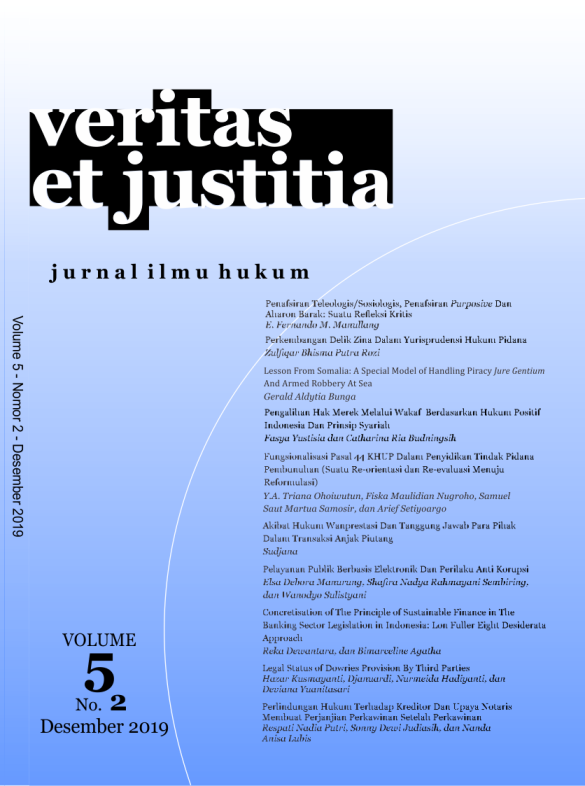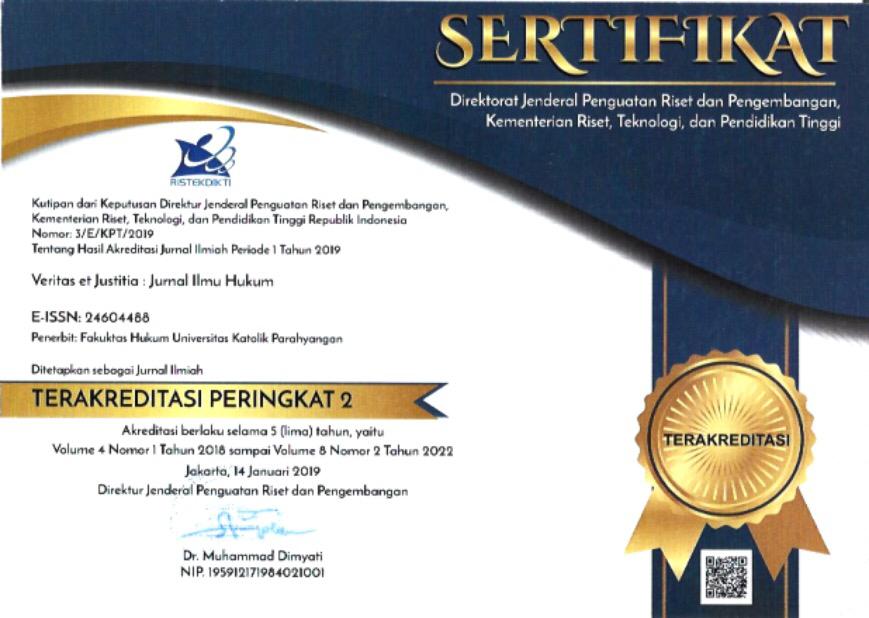PENAFSIRAN TELEOLOGIS/SOSIOLOGIS, PENAFSIRAN PURPOSIVE DAN AHARON BARAK: SUATU REFLEKSI KRITIS
DOI:
https://doi.org/10.25123/vej.v5i2.3495Abstract
Teleological interpretation is construed the same as sociological interpretatio, because it cores on the intention and purpose in making a rule. Such interpretation is also known as purposive interpretation. However, unlike the teleological and purposive interpretations known in the continental and common law legal traditions, Aharon Barak proposed his version of purposive interpretation. This article seeks to explain as simple as possible what teleological interpretation, sociological interpretation, purposive interpretation within the common law tradition and purposive interpretation according to Aharon Barak.
References
Daftar Pustaka
Buku:
A.B. Kafaltiya, Interpretation of Statutes, Universal Law Publishing, New Delhi, 2010.
A.B. Kusuma, Lahirnya Undang-Undang Dasar 1945: Memuat Salinan Dokumen Otentik Badan Oentoek Menyelidiki Oesaha2 Persiapan Kemerdekaan. Pusat Studi Hukum Tatanegara Fakultas Hukum Universitas Indonesia, Jakarta 2004.
Aharon Barak, Purposive Interpretation in Law, Princenton University Press, Princenton, 2005.
András Jakab & Johanna Fröhlich, The Constitutional Court of Hungary, dalam Comparative Constitutional Reasoning, ed. András Jakab, Arthur Dyevre & Giulo Itzcovich, Cambridge University Press, Cambridge, 2017.
Avery Goldman, The Principle of Purposiveness: From the Beautiful to the Biological and Finally to the Political in Kant’s Critique of Judgment, dalam Politics and Teleology in Kant, ed. Paul Formosa, Avery Goldman and Tatiana Patrone, University of Wales Press, Cardiff, 2014.
Baso Madiong, Sosiologi Hukum: Suatu Pengantar, Sah Media, Makassar, 2014.
Claus Beisbart, Kant’s Charaterization of Natural Ends, dalam Kant Yearbook 1/2009: Teleology, ed. Dietmar H. Heidemann, Walter de Gruyter, Berlin, 2009.
Courtney D. Fugate, The Teleology of Reason: A Study of the Structure of Kant’s Critical Philosophy, Walter de Gruyter, Berlin. 2014.
Dahlan, Problematika Keadilan dalam Penerapan Pidana terhadap Penyalah Guna Narkotika, Deepublish, Yogyakarta, 2017.
Dawn Watkins & Mandy Burton, “Introduction”, dalam Research Methods in Law, ed. Dawn Watkins & Mandy Burton. Routledge, New York, 2013.
E. Fernando M. Manullang, Menggapai Hukum Berkeadilan: Tinjauan Hukum Kodrat dan Antinomi Nilai, Penerbit Buku Kompas, Jakarta, 2007.
________________________________, Legisme, Legalitas, dan Kepastian Hukum, Kencana, Jakarta, 2016.
F.A.R. Bennion, Understanding Common Law Legislation: Drafting and Interpretation, Oxford University Press, Oxford, 2009.
Gambarotto, Andrea. Vital Forces, Teleology and Organization: Philosophy of Nature and the Rise of Biology in Germany, Springer, Switzerland. 2018.
Garry Slapper & David Kelly, The English Legal System, Cavendish Publishing Limited, London, 2003.
Hans Kelsen, Pure Theory of Law, transl, Mark Knight, The Lawbook Exchange, New Jersey, 2005.
I Made Pasek Diantha, Metodologi Penelitian Hukum Normatif dalam Justifikasi Teori Hukum, Prenadamedia Group, Jakarta, 2016.
Jaenal Aripin, Jejak Langkah Peradilan Agama di Indonesia, Kencana, Jakarta, 2009.
James Bernard Murphy, The Philosophy of Positive Law: Foundations of Jurisprudence, Yale University Press, New Haven, 2005.
_____________________________, Habit and Convention at the Foundation of Custom, dalam The Nature of Customary Law: Legal, Historical and Philosophical Perspectives, ed. Amanda Perreau-Saussine & James Bernard Murphy, Cambridge University Press, Cambridge, 2007.
Jan Schröder, The Concept and Means of Legal Interpretation in 18th Century, dalam Interpretation of Law in the Age of Enlighment: From the Rule of the King to the Rule of Law, ed. Morigiwa Yasutomo, Michael Stolleis, Jean-Louis Halpérin, Springer, Dordrecht, 2011.
Jonaedi Efendi dan Johnny Ibrahim, Metode Penelitian Hukum Normatif dan Empiris, Prenadamedia, Depok, 2018.
Karl-Heinz Ladeur, From the Deductive to the Argumentative Rationality of Law dalam Law, Interpretation and Reality: Essays in Epistemology, Hermeneutics and Jurisprudence, ed. Patrick Nerhot. Springer, Dordrecht, 1990.
Paolo Becchi, German Legal Science: The Crisis of Natural Law Theory, the Historicisms, and “Conceptual Jurisprudence”, dalam A Treatise of Legal Philosophy and General Jurisprudence Vol. 9: A History of the Philosophy of Law in the Civil Law World, 1600-1900, ed. Damiano Canale, Paolo Grossi & Hasso Hofmann, Springer, Dordrecht 2009.
Pietro Costa, The Rule of Law: A Historical Introduction, dalam The Rule of Law: History, Theory and Criticism, ed. Pietro Costa & Danilo Zolo, Springer, Dordrecht, 2007.
M.C.A. Ricklefs, History of Modern Indonesia since c. 1200, Third Edition, Palgrave, Hampshire, 2001.
M. Freeman, D. A. Llyod’s Introduction to Jurisprudence, Ninth Edition, Thomson Reuters, London, 2014.
Mohammad Koesnoe, Dasar dan Metode Ilmu Hukum Positif, Airlangga University Press, Surabaya, 2010.
Nicholas Bunnin & Jiyuan Yu, The Blackwell of Western Philosophy, Blackwell Publishing, Massachusetts, 2004.
Nurul Qamar dan Salle, Logika dan Penalaran dalam Ilmu Hukum, SIGn. Makassar, 2018.
Pontang Moerad, Pembentukan Hukum Melalui Putusan Pengadilan dalam Perkara Pidana, Alumni, Bandung, 2005.
Ruth Sullivan, Staturory Interpretation, Irwin Law, Toronto 2007.
Sri Warjiyati, Memahami Dasar Ilmu Hukum: Konsep Dasar Ilmu Hukum, Prenadamedia Group, Jakarta, 2018.
Suri Ratnapala, Jurisprudence, Cambridge University Press, Cambridge, 2009.
Teun van Dijk, Ideology: A Multidisciplinary Approach, Sage Publications, London 1998.
William D. Popkin, Statutes in Court: The History and Theory of Statutory Interpretation, Duke University Press, Durham, 1999.
Disertasi:
Faizal Ismail, Islam, Politics and Ideology in Indonesia: A Study of The Process of Muslim Acceptance of the Pancasila, Dissertation, Institute of Islamic Studies, McGill University, Montreal, 1995.
Jurnal:
Afif Khalid, Penafsiran Hukum oleh Hakim dalam Sistem Peradilan di Indonesia, Al’Adl, Volume VI, Nomor 11, Januari-Juni 2014.
Arif Hidayat, Penemuan Hukum melalui Penafsiran Hakim dalam Putusan Pengadilan, Pandecta, Volume 8, Nomor 2, Juli 2013.
Aris Hardinanto, Manfaat Analogi dalam Hukum Pidana untuk Mengatasi Kejahatan yang Mengalami Modernisasi, Yuridika, Volume 31, No. 2, Mei 2016.
Crompton Llewellyn Davies, Kant's Teleology, Proceedings of the Aristotelian Society, Vol. 3, No. 2.1895 - 1896.
Daniel Kolb, Kant, Teleology, and Evolution, Synthese, Vol. 91, No. 1/2, Philosophy of Biology in Historical and Cultural Contexts. Apr. - May, 1992.
E. Fernando M. Manullang, Sesat Pikir Aplikasi Hermeneutika Hukum Menurut Hans-Georg Gadamer, Jurnal Hukum & Pembangunan 48 No. 2. 2018.
Ernst Mayr, The Idea of Teleogy, Journal of the History of Ideas, Vol. 53, No. 1. Jan. – Mar., 1992.
Harašić, Žaklina, More about Teleological Argumentation in Law, Pravni Vjesnik, Vol. 31, No. 3-4. 2015.
Joachim Rückert, Friedrich Carl von Savigny, the Legal Method, and the Modernity of Law, Juridica International, XI. 2006.
Marinković Tanasije, Barak’s Purposive Interpretation in Law as a Pattern of Constitutional Interpretative Fidelity, Baltic Journal of Law and Politics, Volume 9, Number 2. 2016.
Roberto Mangabeira Unger, The Critical Legal Studies Movement, Harvard Law Review, Vol. 96, No. 3. Jan., 1983.
Downloads
Published
Issue
Section
License
Authors who publish with this journal agree to the following terms:
Authors retain copyright and grant the journal right of first publication with the work simultaneously licensed under a Creative Commons Attribution License that allows others to share the work with an acknowledgement of the work's authorship and initial publication in this journal.
Authors are able to enter into separate, additional contractual arrangements for the non-exclusive distribution of the journal's published version of the work (e.g., post it to an institutional repository or publish it in a book), with an acknowledgement of its initial publication in this journal.
Authors are permitted and encouraged to post their work online (e.g., in institutional repositories or on their website) prior to and during the submission process, as it can lead to productive exchanges, as well as earlier and greater citation of published work.
The Journal allow the author(s) to hold the copyright and to retian publishing rights without restrictions.










